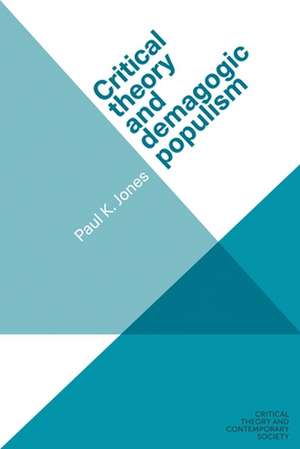Critical Theory and Demagogic Populism: Critical Theory and Contemporary Society
Autor Paul K. Jonesen Limba Engleză Paperback – 25 apr 2022
| Toate formatele și edițiile | Preț | Express |
|---|---|---|
| Paperback (1) | 345.05 lei 43-57 zile | |
| MANCHESTER UNIVERSITY PRESS – 25 apr 2022 | 345.05 lei 43-57 zile | |
| Hardback (1) | 424.15 lei 22-36 zile | +31.17 lei 5-11 zile |
| MANCHESTER UNIVERSITY PRESS – 2 noi 2020 | 424.15 lei 22-36 zile | +31.17 lei 5-11 zile |
Din seria Critical Theory and Contemporary Society
-
 Preț: 208.70 lei
Preț: 208.70 lei -
 Preț: 155.55 lei
Preț: 155.55 lei -
 Preț: 206.64 lei
Preț: 206.64 lei -
 Preț: 177.90 lei
Preț: 177.90 lei -
 Preț: 155.23 lei
Preț: 155.23 lei - 23%
 Preț: 536.90 lei
Preț: 536.90 lei - 23%
 Preț: 536.99 lei
Preț: 536.99 lei - 22%
 Preț: 256.59 lei
Preț: 256.59 lei - 12%
 Preț: 278.94 lei
Preț: 278.94 lei - 22%
 Preț: 257.21 lei
Preț: 257.21 lei -
 Preț: 278.32 lei
Preț: 278.32 lei - 13%
 Preț: 255.29 lei
Preț: 255.29 lei - 22%
 Preț: 832.65 lei
Preț: 832.65 lei - 31%
 Preț: 771.26 lei
Preț: 771.26 lei - 22%
 Preț: 889.88 lei
Preț: 889.88 lei -
 Preț: 237.75 lei
Preț: 237.75 lei - 13%
 Preț: 254.75 lei
Preț: 254.75 lei
Preț: 345.05 lei
Nou
Puncte Express: 518
Preț estimativ în valută:
66.02€ • 69.12$ • 54.63£
66.02€ • 69.12$ • 54.63£
Carte tipărită la comandă
Livrare economică 07-21 aprilie
Preluare comenzi: 021 569.72.76
Specificații
ISBN-13: 9781526163738
ISBN-10: 152616373X
Pagini: 288
Dimensiuni: 156 x 234 x 19 mm
Greutate: 0.42 kg
Editura: MANCHESTER UNIVERSITY PRESS
Seria Critical Theory and Contemporary Society
ISBN-10: 152616373X
Pagini: 288
Dimensiuni: 156 x 234 x 19 mm
Greutate: 0.42 kg
Editura: MANCHESTER UNIVERSITY PRESS
Seria Critical Theory and Contemporary Society
Notă biografică
Paul K. Jones is Reader in Sociology in the Research School of Social Sciences at the Australian National University
Descriere
This is the first study to make a detail case for the Frankfurt School's relevance to understanding contemporary populism. It reconstructs their analysis of 'modern demagogy' and demonstrates its advantages over orthodox 'populism studies' and the work of Laclau. The book also extends the Institute's analysis to assess 'counter-demagogic' forces. -- .
